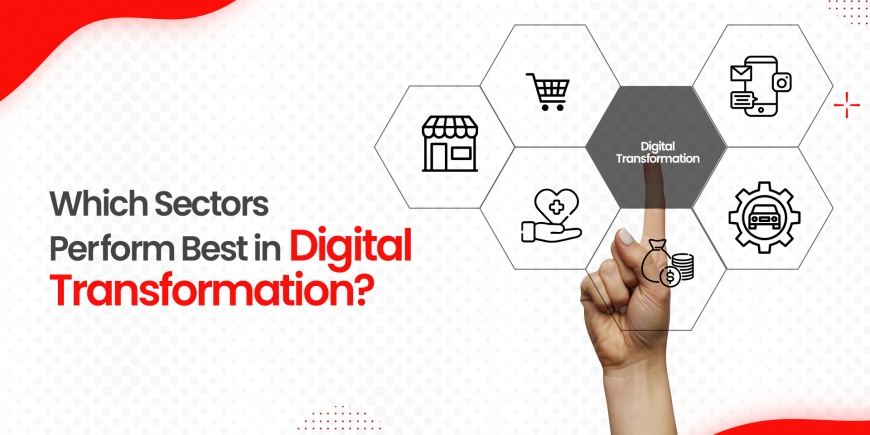Which Sectors Perform Best In Digital Transformation?
According to statistics and research, only 30% of transformations met or exceeded their target outcomes, resulting in long-term change. While individual company success varies greatly, even within industries and sectors, we were curious as to why different sectors had, on average, varying degrees of digital success.
We compared the digital transformation success data to BCG’s Digital Acceleration Index data, which measures companies’ digital maturity and can be categorized by sector.
The Importance of Digital Transformation
The rise of e-commerce titans like Amazon, Alibaba, and JD.com has forced traditional logistics firms to become more agile, flexible, and efficient. With Covid-19 fueling global online shopping, the digital transformation of the logistics industry is expected to accelerate in the coming years,” according to the report. It also suggested that more customized approaches are needed to support industry transformation better.
Consultants in digital transformation assist businesses and firms in understanding this process and bridging the gap between advancements and firms. One of the key findings is that companies that are ahead of the digitalization curve have placed a high priority on plant/factory connectivity. It enables them to better leverage data in order to generate new insights and make more real-time decisions.

Sectors that excel at digital transformation
To meet changing market and customer expectations, digital transformation employs digital technologies to transform traditional business processes and services. As a result, how businesses are managed and operated, as well as how value is delivered to customers, has been completely transformed.
Fintech
The financial sector, like many other industries, required digital transformation, but the process was slow until the urgency of COVID-19 pushed it. However, large corporations had all the resources they needed to survive the pandemic, while small and medium-sized businesses struggled.
Digital business technologies are the solution to the problem because they can significantly affect information exchange and reduce transaction costs. As a result, small financial transactions become more affordable and can be conducted more frequently. As a result, it is still beneficial for various financial platforms, such as blockchains and cryptocurrencies.
Because this industry is so competitive, it necessitates customized solutions that are unique to each case. Our project produced a balanced and adaptable solution. An advertiser on our ICO platform pays for the number of clicks to his website rather than just listing.
Furthermore, the platform assumes deep analytics and report download. As a result, we created a product that makes information easily accessible, has a minimalistic UI, a user-friendly UX, and, last but not least, allows us to quickly attract a large number of investors.
Energy
Energy companies are frequently tasked with adhering to new regulations while remaining competitive, which is why digital transformation is so important. Energy companies benefit from valuable data about potential equipment failures provided by automated machinery and sensors.
Field agents can now complete tasks more quickly thanks to new mobile capabilities. As a result, customers receive better service while unexpected costs are reduced.
Automotive
The automotive industry can still exist in the absence of collaboration with the IT sector. However, in this case, survival does not imply success. The benefits of digital transformation can have a significant impact on the automotive industry because they are in high demand, which may not be obvious at first glance.
To begin with, a modern car requires connectivity. Many devices, such as GPS navigators, vehicle cameras, and monitors, are used for various purposes. All of these and other devices must be linked together using a cable, Bluetooth, Wi-Fi, and other methods. It is necessary to use the appropriate software to facilitate their connectivity. As a result, these devices’ and systems’ work will be automated, improving the user experience.
Second, automobiles are no longer what they once were. The electrification trend dictates the new rules, and digital transformation solutions can assist many drivers in making the transition from traditional energy sources to electricity with ease. Both electric and conventional vehicles are electrified as a result of features such as power-assisted steering, intelligent lighting systems, traction control, airbags, and others.
Finally, there is an increasing demand for shared mobility services. Renting anything from bicycles and scooters to cars and vans is possible, and the demand for such services is increasing. To support such a business, its owners must create a mobile application. A team of professional developers can turn a business idea into a real project in this manner.
Media
The media industry has always been quick to adopt new technologies, particularly in this era of digital transformation. The expansion of available content on mobile devices is only the beginning. Changes in eCommerce market trends refer to e-commerce websites that undergo digital transformation in order to raise brand awareness. From social media to pay-per-click advertising, the world of digital marketing has completely changed.
Media companies collect data and use machine learning to recommend personalized content to users. This includes commercials aimed at specific individuals. Media is rapidly changing as potential AI news anchors emerge.
Healthcare
During the COVID-19 pandemic, the healthcare industry and everything connected to medicine must go digital. The medical field has always assumed a lot of paperwork, and the transition to electronic documentation will reduce the amount of live contact between people.
Owners, employees, and customers in the healthcare industry benefit from one of the most important benefits of digitization in this way. Furthermore, electronic documents can be managed and organized using specialized software. However, documentation is only one of the many aspects of healthcare that can be improved.
Medical websites are useful because they:
1. help therapists manage patients’ information effectively;
2. allow patients to upload and update their information;
3. monitor therapist workload;
4. create a map that can be used to find the nearest therapist;
5. have an Admin Portal where management can add, delete, and modify the website’s content.
The following are the essential factors for digital transformation success:
1. An Integrated Strategy with Specific Transformation Objectives. The strategy explains why, what, and how, all of which are linked to specific, quantifiable business outcomes.
2. Commitment to leadership from the CEO down through middle management. The company has high levels of leadership engagement and alignment, as well as middle-management ownership and accountability, which is often overlooked.
3. Using High-Quality Personnel. Management identifies and releases the most talented individuals to drive the transformation program.
4. An Agile Governance Mindset that Encourages Broader Adoption. Leaders respond quickly to roadblocks, adapt to changing contexts, and drive cross-functional, mission-oriented, “fail-fast-learn” behavioral change throughout the organization. They deal with individual challenges while keeping the larger goals in mind.
5. Effective Progress Toward Defined Outcomes Monitoring. With sufficient data availability and quality, the company establishes clear metrics and targets around processes and outcomes.
6. Modular Technology and Data Platform Driven by Business. To enable secure, scalable performance, rapid change deployment, and seamless ecosystem integration, the company implements a fit-for-purpose, modern technology architecture driven by business needs.
Companies that began earlier are now progressing to the next level of digitized process integration. In today’s digital economy, connectivity is quickly overtaking automation as a critical success factor. Many companies have already established interoperable and secure networks within their manufacturing facilities, allowing equipment, machinery, and computer-based systems to interact and exchange data with few constraints.
There is a high level of diversity across various industry sectors, and more tailored approaches are required to support industry transformation better. HOD is a leading digital transformation and consulting firm that has experts to guide you in your digital transformation journey. Considering the importance of education, leadership, and skill development in the hyper-competitive world, we also provide many IT-enabled services.
298 total views
There are no comments



